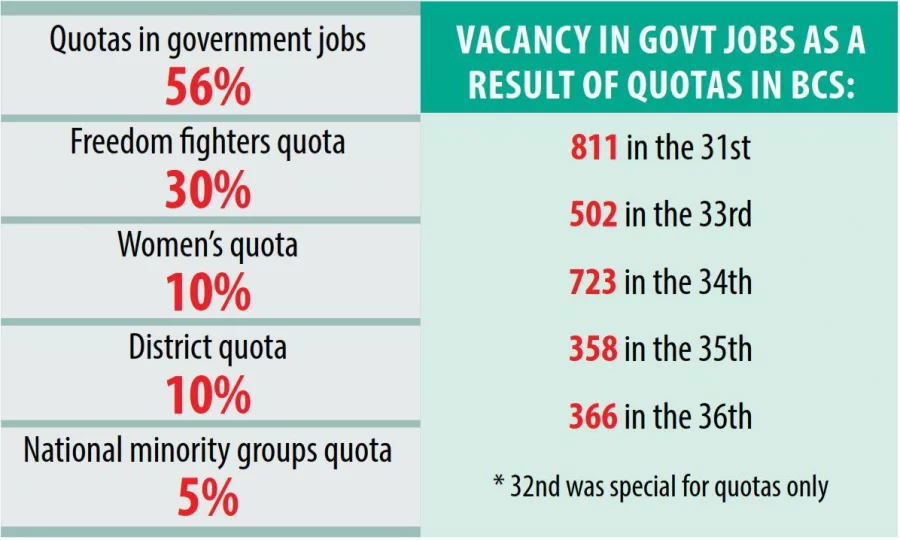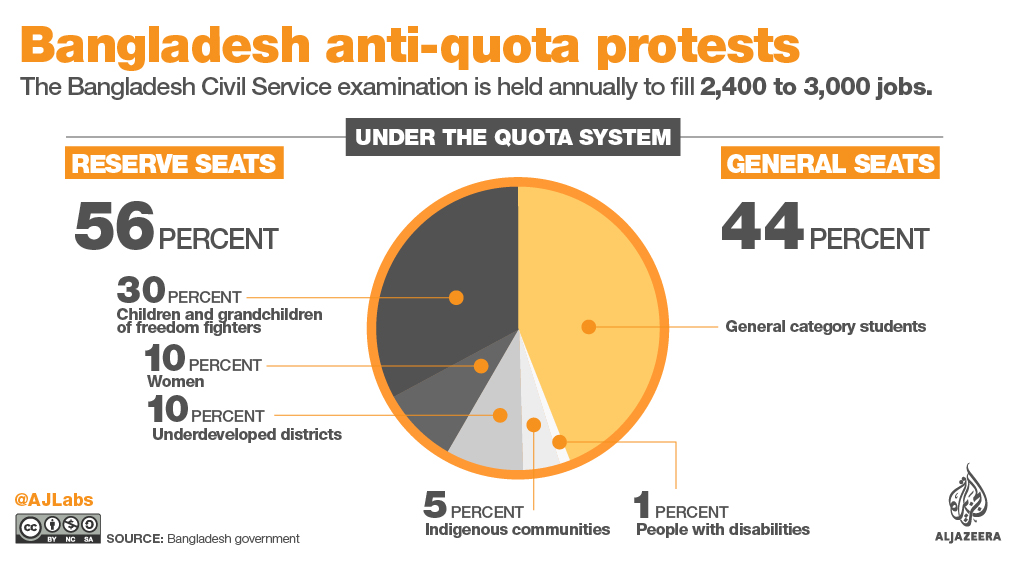The Freedom Fighter Quota System in Bangladesh reserves a percentage of government jobs and educational opportunities for descendants of freedom fighters. This system aims to honor the contributions of those who fought for the country’s independence.
The Freedom Fighter Quota System in Bangladesh is a significant policy designed to recognize and honor the sacrifices made by freedom fighters during the 1971 Liberation War. Implemented in various sectors, including education and government employment, this quota ensures that descendants of freedom fighters receive preferential treatment.
This initiative not only acknowledges the historical contributions of these heroes but also aims to provide socio-economic support to their families. The system has been a topic of debate, with supporters emphasizing its necessity for social justice and critics calling for reforms to ensure fairness.
Historical Background
The Freedom Fighter Quota System in Bangladesh holds significant historical importance. This system was established to honor those who fought for the country’s independence.
Liberation War Legacy
In 1971, Bangladesh fought a brutal war to gain independence from Pakistan. The war lasted nine months and cost many lives. The freedom fighters played a crucial role in securing victory. These brave individuals risked their lives for the nation’s freedom.
After independence, the new government wanted to honor these heroes. They introduced various benefits for the freedom fighters and their families. The Freedom Fighter Quota System was one such initiative. Its aim was to provide better opportunities for the descendants of these heroes.
Initial Implementation
The Freedom Fighter Quota System was first implemented in the 1970s. The government reserved a certain percentage of jobs and educational seats for the families of freedom fighters. This quota was meant to ensure that these families had better access to opportunities.
The system was initially met with widespread approval. Many saw it as a just reward for the sacrifices made during the war. Over the years, the system has undergone several changes. Yet, its core purpose remains the same: to honor the legacy of the freedom fighters.
Below is a table showing the initial quota distribution:
| Sector | Reserved Quota |
|---|---|
| Government Jobs | 30% |
| Educational Institutes | 10% |
The quota system has had its share of controversies. Critics argue that it sometimes leads to unfair advantages. Despite the debates, the system continues to be an integral part of Bangladesh’s socio-political fabric.

Credit: www.indiatoday.in
Current Quota System
The Freedom Fighter Quota System in Bangladesh has specific guidelines. This system aims to honor those who fought for the nation. The current system allocates a certain percentage of government jobs and educational seats to descendants of freedom fighters.
Eligibility Criteria
To qualify for the Freedom Fighter Quota, applicants must meet certain conditions:
- Direct descendants of freedom fighters are eligible.
- Applicants must provide valid proof of their lineage.
- Freedom fighters must be recognized by the government.
Valid documents include:
- Freedom fighter’s certificate
- National ID card
- Birth certificate of the applicant
Application Process
The application process for the Freedom Fighter Quota involves several steps:
- Collect necessary documents.
- Complete the application form.
- Submit the form and documents to the relevant authority.
A table summarizing the Application Steps can help:
| Step | Description |
|---|---|
| 1 | Collect necessary documents. |
| 2 | Complete the application form. |
| 3 | Submit the form and documents. |
The authorities will verify the documents. After verification, the quota benefits are granted.
Benefits For Descendants
The Freedom Fighter Quota System in Bangladesh offers numerous benefits. These advantages significantly impact the lives of the descendants of freedom fighters. Below are some key areas where they receive support.
Educational Opportunities
Descendants of freedom fighters get special educational opportunities. They receive scholarships and financial aid for their studies. Many institutions reserve seats specifically for them.
Here is a table showing some of the benefits:
| Institution Type | Benefits |
|---|---|
| Primary Schools | Reserved Seats |
| Secondary Schools | Scholarships |
| Universities | Financial Aid |
These benefits ensure that they have access to quality education. This support helps them achieve their educational goals.
Job Reservations
The quota system also provides job reservations for descendants. Government jobs have a specific percentage of positions set aside for them.
Here are the key points:
- Reserved positions in government jobs.
- Priority in hiring processes.
- Special training programs.
These job reservations ensure that they have stable employment opportunities. This support enables them to build successful careers.
Challenges And Criticisms
The Freedom Fighter Quota System in Bangladesh aims to honor the sacrifices of freedom fighters. Yet, it faces several challenges and criticisms. This section will explore the main issues linked to the quota system.
Allegations Of Misuse
The quota system is often criticized for alleged misuse. Some claim that fake freedom fighter certificates are used to gain benefits. These allegations undermine the system’s integrity. It is crucial to address these concerns to maintain public trust.
Another issue is the lack of proper verification. Many believe that better verification processes are needed. This would ensure only genuine freedom fighters and their families benefit. Improved verification can reduce the misuse of the quota system.
Public Perception
Public perception of the Freedom Fighter Quota System is mixed. Some view it as a necessary means to honor freedom fighters. Others see it as an outdated and unfair advantage.
Many young people feel the system creates inequality. They argue that merit should be the only criterion for jobs and education. This view has led to protests and demands for reform.
Overall, the public is divided on the quota system’s relevance. Addressing public concerns can help improve the system’s acceptance.
Government Initiatives
The Bangladesh government has made significant strides in honoring freedom fighters. They have introduced various initiatives to support these heroes and their families. These initiatives aim to recognize their sacrifices and provide them with better opportunities.
Policy Reforms
The government has implemented several policy reforms to ensure the well-being of freedom fighters. These reforms include:
- Reserved seats in educational institutions
- Priority in government jobs
- Special allowances and pensions
These policies aim to improve their quality of life and honor their contributions.
Monitoring Mechanisms
To ensure the effective implementation of these policies, the government has set up various monitoring mechanisms. These mechanisms include:
| Mechanism | Purpose |
|---|---|
| Regular Audits | Check policy effectiveness |
| Feedback Systems | Gather feedback from beneficiaries |
| Evaluation Committees | Assess policy impact |
These measures ensure that the benefits reach the intended recipients and that the policies are working as intended.
Impact On Society
The Freedom Fighter Quota System in Bangladesh has far-reaching effects on society. This system aims to recognize and reward the sacrifices of freedom fighters. It also seeks to uplift their families. The impact of this system is profound and multi-faceted. Let’s delve into its effects on social equity and economic empowerment.
Social Equity
The quota system promotes social equity by providing opportunities. Families of freedom fighters gain access to education and jobs. This helps bridge the gap between different social classes. The system ensures that these families are not left behind. It brings more inclusivity into society.
Here are some benefits in terms of social equity:
- Increased access to education for freedom fighters’ families.
- Special job reservations in government sectors.
- Priority in housing and healthcare services.
Economic Empowerment
The quota system also leads to economic empowerment. It provides financial stability to the families of freedom fighters. This results in improved living standards. The economic benefits create a ripple effect. It boosts local economies and reduces poverty.
Consider these economic advantages:
- Scholarships for higher education.
- Reserved seats in government jobs.
- Access to special loans and grants.
A table summarizing the economic impact:
| Benefit | Description |
|---|---|
| Scholarships | Financial aid for education. |
| Job Reservations | Reserved seats in government sectors. |
| Loans and Grants | Special financial support programs. |
Comparative Analysis
The Freedom Fighter Quota System in Bangladesh has been a topic of much debate. To better understand its effectiveness, we can compare it with global practices. This section will analyze how other countries implement similar systems and what lessons Bangladesh can learn.
Global Practices
Many countries have implemented quota systems to support specific groups. These practices offer valuable insights.
| Country | Quota System | Target Group |
|---|---|---|
| India | Reservation System | Scheduled Castes, Tribes |
| USA | Affirmative Action | Minorities, Women |
| South Africa | Employment Equity | Previously Disadvantaged Groups |
India uses a Reservation System to support marginalized communities. This system ensures fair representation in education and jobs.
The USA implements Affirmative Action to promote diversity. It focuses on providing equal opportunities in education and employment.
South Africa has an Employment Equity policy. It aims to rectify past injustices by promoting previously disadvantaged groups.
Lessons For Bangladesh
Bangladesh can learn from these global practices to improve its Freedom Fighter Quota System.
- Transparency: Clear criteria and transparent processes help build trust.
- Regular Reviews: Periodic reviews ensure the system remains effective.
- Inclusive Policies: Policies should be inclusive and benefit all target groups.
- Public Awareness: Educating the public about the quota system can reduce misunderstandings.
Implementing these lessons can help Bangladesh enhance its quota system. This will ensure it benefits the intended groups and supports national development.

Credit: www.dhakatribune.com
Future Prospects
The Freedom Fighter Quota System in Bangladesh has seen various changes. The future holds potential for more adjustments and improvements. This section explores proposed changes and sustainable solutions for the system.
Proposed Changes
Experts suggest several changes to the Freedom Fighter Quota System. These changes aim to make the system fairer and more effective.
- Quotas for Descendants: Expanding quotas to grandchildren of freedom fighters.
- Merit-Based Considerations: Balancing quota benefits with merit criteria.
- Transparency Measures: Ensuring clear and transparent selection processes.
These changes could help more deserving candidates benefit from the system.
Sustainable Solutions
Ensuring the sustainability of the Freedom Fighter Quota System is key. Below are some sustainable solutions:
- Regular Reviews: Conducting periodic reviews to assess system effectiveness.
- Data-Driven Decisions: Using data to make informed policy adjustments.
- Enhanced Support: Providing additional support to freedom fighters’ families.
Implementing these solutions can help maintain the system’s relevance and fairness.
| Proposed Change | Expected Impact |
|---|---|
| Quotas for Descendants | Benefits more families |
| Merit-Based Considerations | Ensures fairness |
| Transparency Measures | Builds trust |
These tables and lists summarize the potential changes and their impacts. The Freedom Fighter Quota System can evolve to better serve future generations.

Credit: www.cnn.com
Conclusion
The Freedom Fighter Quota System in Bangladesh remains a significant topic. It honors those who fought for independence. Balancing fairness and merit is crucial for its future. Understanding its impact on education and employment can foster informed discussions. This quota system continues to shape the nation’s path forward.



